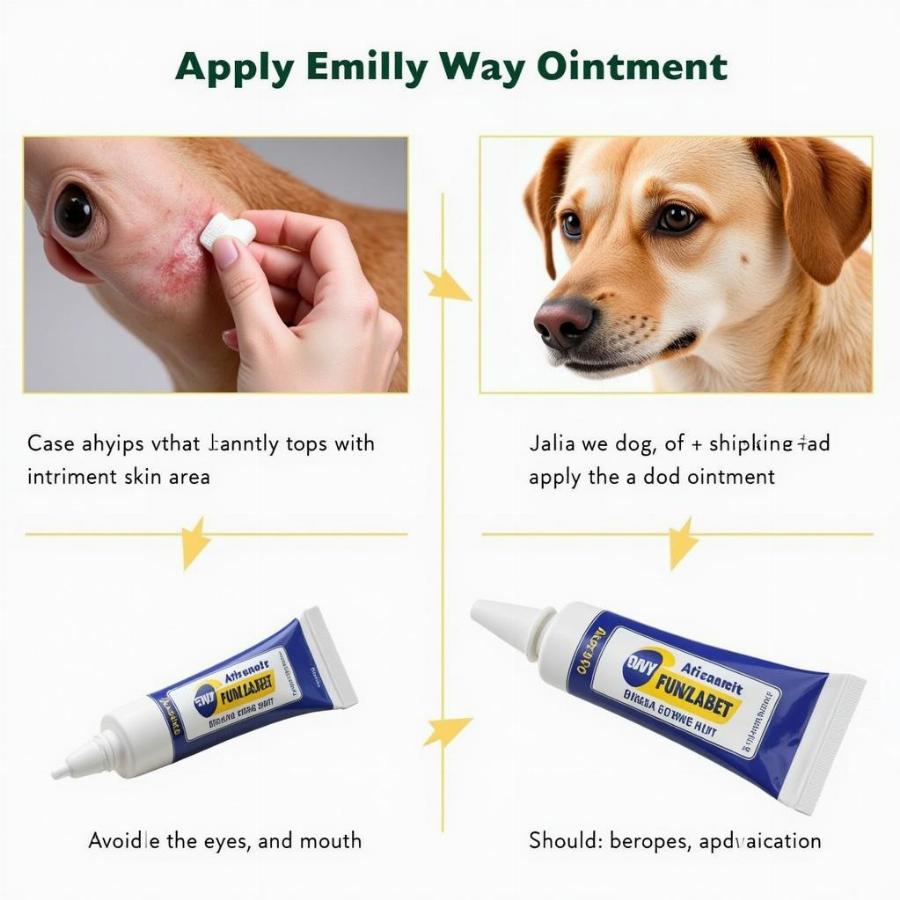3-way ointment for dogs is a common topical medication used to treat a variety of skin conditions. Understanding its uses, benefits, and potential side effects is crucial for responsible pet ownership. This article will delve into the details of 3-way ointments, helping you make informed decisions about your dog’s skin health. We’ll cover everything from identifying when a 3-way ointment might be necessary to understanding the application process and potential precautions.
What is 3-Way Ointment and How Does it Work?
3-way ointments typically contain three active ingredients: an antibiotic, an antifungal, and a steroid. The antibiotic combats bacterial infections, the antifungal addresses fungal infections, and the steroid reduces inflammation and itching. This combination makes 3-way ointments versatile for treating various skin issues in dogs. These ointments are generally prescribed for localized skin problems like hot spots, minor cuts, abrasions, and certain types of dermatitis.
 Applying 3-way ointment to a dog's skin
Applying 3-way ointment to a dog's skin
Common Uses of 3-Way Ointment in Dogs
3-way ointment can be beneficial for a variety of skin ailments in dogs. Here are some common uses:
- Hot spots: These inflamed, itchy lesions can be effectively treated with 3-way ointment due to its anti-inflammatory and antibacterial properties.
- Infected cuts and scrapes: The antibiotic component helps prevent infection while the steroid reduces inflammation and promotes healing.
- Ringworm: While primarily an antifungal issue, the combined action of the 3-way ointment can help manage secondary bacterial infections and inflammation.
- Allergic reactions: While not a cure for allergies, the steroid in 3-way ointment can provide temporary relief from itching and inflammation caused by allergies. You can learn more about allergy testing costs at our allergy testing for dogs cost page.
Applying 3-Way Ointment Safely
Always follow your veterinarian’s instructions regarding the application of 3-way ointment. Generally, you should clean the affected area before applying a thin layer of ointment. Avoid applying the ointment near the eyes or mouth. Some dogs may lick the ointment, so using an Elizabethan collar might be necessary. For further information on eye care, check out our dedicated page on eye care for dogs.
Potential Side Effects and Precautions
While generally safe, 3-way ointments can have some potential side effects, including:
- Thinning of the skin: Prolonged use of steroids can thin the skin, making it more susceptible to injury.
- Increased thirst and urination: These can be signs of steroid absorption.
- Gastrointestinal upset: If ingested, the ointment can cause vomiting or diarrhea.
If you notice any unusual symptoms after applying 3-way ointment, consult your veterinarian immediately. You should also inform your vet about any other medications your dog is taking, as interactions are possible. Learn more about Sulfodene 3-Way Ointment at our sulfodene 3-way ointment for dogs page.
When to Consult a Veterinarian
It’s essential to consult a veterinarian before using any medication on your dog, including 3-way ointment. They can diagnose the underlying condition and determine the appropriate treatment. If your dog’s skin condition doesn’t improve or worsens after a few days of using the ointment, contact your vet. If you’ve noticed a white patch on dogs eye, consult a vet immediately.
Conclusion
3-way ointment for dogs can be a useful tool in managing various skin conditions. Understanding its proper use and potential side effects is crucial for ensuring your dog’s well-being. Always consult your veterinarian before using 3-way ointment and follow their instructions carefully.
FAQ
- Can I use human 3-way ointment on my dog? No, never use human medications on your dog without consulting a veterinarian. The formulations and dosages can be different and harmful to your pet.
- How long does it take for 3-way ointment to work? You should see some improvement within a few days. If not, contact your veterinarian.
- What if my dog licks the ointment? While small amounts are usually not harmful, excessive licking can lead to gastrointestinal upset. Use an Elizabethan collar to prevent licking.
- Can I use 3-way ointment on open wounds? Yes, but only under the guidance of a veterinarian.
- Are there natural alternatives to 3-way ointment? Discuss potential natural remedies, like calendula for dogs, with your vet.